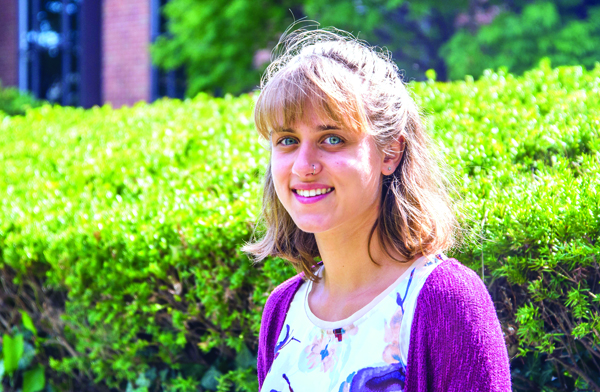2018 Harpur Fellows: Georgia Kerkezis
Junior builds wheelchair-accessible community garden in Binghamton

Georgia Kerkezis is sowing seeds for social change in her own community.
“You always hear about students who come for four years and leave,” Kerkezis said. “That makes me sad because we’re taking so much away from Binghamton − education, experiences − and we owe it to the University, and the city, to give back.”
Kerkezis, a junior studying environmental science with a minor in geography, used her Harpur Fellows’ grant to build a wheelchair-accessible community garden on the East Side of Binghamton, N.Y.
“It’s going to be 150-by-50 feet of land with raised garden beds,” Kerkezis explained. “There’s going to be around eight beds built on a concrete slab, so people who can’t walk on wood chips, or whatever we lay down, can still access them.”
Kerkezis’ drive to help her community came from her work with Collegiate Professor Al Vos and the Hinman Public Service Learning Community.
“He was the person who really inspired me to do [the project] because he knows I have a passion for environmental issues and community service,” Kerkezis said. “He inspired me to reach out to the community and see what they need.”
So Kerkezis contacted VINES − Volunteers Improving Neighborhood Environments, Inc. − and formulated her project based on its suggestions.
“I went to VINES and talked to Amelia LaDolce, who’s their [executive] director, and we brainstormed together,” Kerkezis said. “VINES has a few wheelchair-accessible garden beds and she told me that those are rented instantly. So we thought if there’s such a high demand for this kind of garden, why not build more?”
But the garden that Kerkezis planned is more than just accessible: It’s also designed to alleviate the food desert on Binghamton’s East Side.
“Most of the gardens are in the west or north [of Binghamton] and the East Side is underserved in that respect, so building one over there helps alleviate food insecurity,” Kerkezis explained. “It provides healthier foods and combats climate change; it brings the community together and beautifies the neighborhood.”
Kerkezis’ garden is going to be built at 19 ½ Abbott Street and will charge $20-$25 for a growing plot for the full growing season.
“VINES already has 12 gardens so this garden is going to be the 13th − they have an initiative to build 20 gardens by 2020,” Kerkezis said.
When planning her project, Kerkezis decided to stay in Binghamton because it allowed her to combine her own environmental knowledge with local resources, ultimately fulfilling one of the city’s needs.
“My worst fear was designing a project that was meant to fit a far-off place, but then getting there and discovering they don’t need it,” Kerkezis said. “That’s why I went to organizations for help; I didn’t want to go somewhere and pretend I knew what was needed.”
A big part of Kerkezis’ project was doing community outreach. Going door-to-door, Kerkezis recruited volunteers and found support for her project.
“All the emails I sent, and going door-to-door for outreach, takes so much longer than you’d think,” Kerkezis said. “Doing one street would take maybe two hours. When you get talking with people you want to educate them on the project and get them involved, so people get excited and want to talk to you!”
Though the process was challenging at times, the affirmation she received from the University and the local community kept her motivated.
“It was a huge learning process, because I didn’t think it would take as long as it did, but it was worth it − all of those intimate one-on-one conversations with people,” she said.
Kerkezis was especially motivated by the excitement that the people in the area expressed.
“I remember meeting one guy in a wheelchair who was saying he would love to get involved but he couldn’t,” Kerkezis said. “I was so excited to say, ‘Actually, you can!’”
For Kerkezis, this project is bigger than just building a garden.
“Another part of building the community gardens is bringing the community members together, getting them out of their houses and apartments to learn from each other and teach each other about gardening,” she said.
Throughout the last three years, Kerkezis learned how to merge her community service projects with her environmental knowledge. By combining the two initiatives, she became interested in urban planning.
“I like environmental studies broadly, but I took some classes on urban policy and urban gardening, and that’s interesting to me − the city aspect,” she said. “People forget the urban aspect to these things and think cities are big metal areas that harm nature, but there’s a lot of potential there.”
Though she plans on extending her community outreach projects beyond the Southern Tier, Kerkezis will take the lessons she learned here with her.
“My teachers [at Binghamton University] are so cool and knowledgeable,” Kerkezis said. “They tie our classes into the Greater Binghamton area, which is great because you can see these problems aren’t just happening in some far-off land − they’re happening in my backyard, too!”

